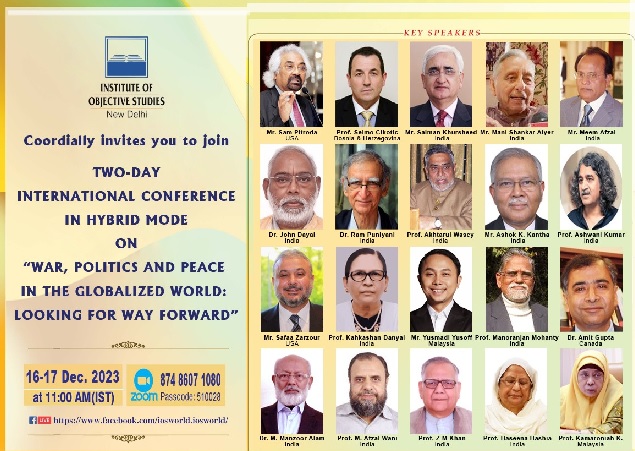Last Updated on December 19, 2023 6:41 pm by INDIAN AWAAZ
International Conference on “War, Politics and Peace in Globalized World: Looking for Way Forward” organised by Institute of Objective Studies, New Delhi

Staff Reporter / New Delhi
USA-based inventor, telecommunication engineer and entrepreneur, Sam Pitroda has said that peace in the world could not be restored without striking a balance between force and power. He expressed concern that several influential leaders of the world were taking recourse to violence, instead of peace in order to pursue their agenda. They were pushing the entire world into a new war which was feared to be disastrous for humanity.
Speaking at the Inaugurating the two-day International Conference on “War, Politics and Peace in the Globalised World: Looking for Way Forward, organized by the Institute of Objective Studies here on December 16 and 17 Pitroda said that war could never ensure peace and security in any region. The path of confrontation would have to be shunned for a better and secure world. It was shameful that the world was in the throes of war even in the 21st century. Most of the world was embroiled in war in one region or the other. He lamented that science and technology which should have been used for peace and prosperity, were being misused to ignite war. This was very pulsating. He called upon the world leaders to sit up and find a way out of the scourge of war. He summed up his observations of the world situation obtaining today in 10 points and warned that democracy, was in danger because of polarization, hates vendetta and violence.

In his keynote address, Prof. Selmo Cikotic, former Defence Minister of Bosnia and Herzegovina held that inter-dependence of countries in a globalized world had become more important than ever before for national and international society. He stressed the need for major technological cooperation among SAARC countries. Noted Islamic scholar and professor emeritus, Jamia Millia Islamia, Prof. Akhtarul Wasey observed that the United Nations was established in 1946, but the five permanent members of the Security Council had been misusing it by their veto power. They always used the Security Council in their own interest. Referring to the recent UN resolution on the cessation of hostilities in Gaza, he said that the resolution was vetoed by the powerful lobby of the Security Council. Because of the veto power, U.N. was handicapped and could not take any action on the resolution. he pleaded that the members of the general assembly of the UN should demand that a resolution supported by more than half of the members of the general assembly should by implemented without the application of the veto power. Only then could peace be restored, he added.
Social activist, Dr. Ram Puniyani, noted that the Palestinian imbroglio had been dragging on for more than 70 years, but the big powers only complicated the issue. These powers brought outsiders to Palestine and displaced the original inhabitants from their land by force. They made Palestine the home to outsiders. Almost two months had elapsed since the Israeli attack on Hamas, but no peace process had yet been initiated. Most of the countries of the world were in favour of the restoration of peace in the area, but due to the stubbornness of a few nations, the war was raging. He attributed it to the imbalance of power. He said that peace could not be restored until balance of power was maintained and the hegemony of one or a few over others prevailed.
Former Member of Parliament and ambassador, Meem Afzal said that politics and war were closely connected to each other. As the war helped succeed in politics, many politician used this tactic to attain power. As against this, peace was essential for prosperity of the people and their progress. He maintained that in peace time, a country progressed and earned popularity at the diplomatic level. The way wars were being waged in the world, it was difficult to accept whether the world had been globalized. The mode of war had changed but the situation remained the same. Ashok K. Kantha, honorary fellow and director, Institute of Chinese Studies, Delhi and former ambassador to China, observed that India played a constructive role in efforts to halt Israel-Palestine war. India did not deviate from its traditional foreign policy which was worthy of mention. India’s efforts to end hostilities and ensure peace in the region were laudable and they spoke of her successful diplomatic initiative, he added.
Chairman of the IOS, Dr. Manzoor Alam, held that peace could be built on the concept of justice for all. He said that if justice was denied on the basis of class, caste, colour, race and region, peace could not be built. Presiding over the session, the secretary general of the institute, Prof. Z.M. Khan remarked that fight was inherent in politics. Politics worked towards fight between the two. He was concerned that fighting among the developed countries had become more common today.
